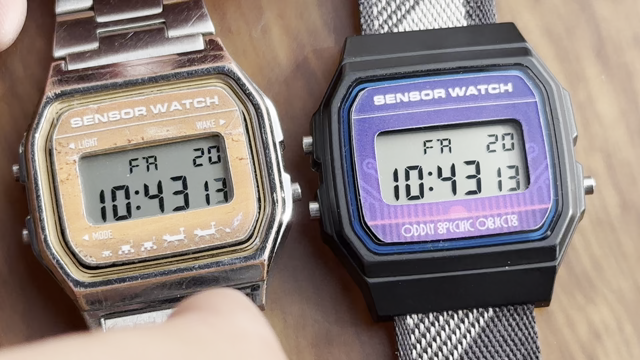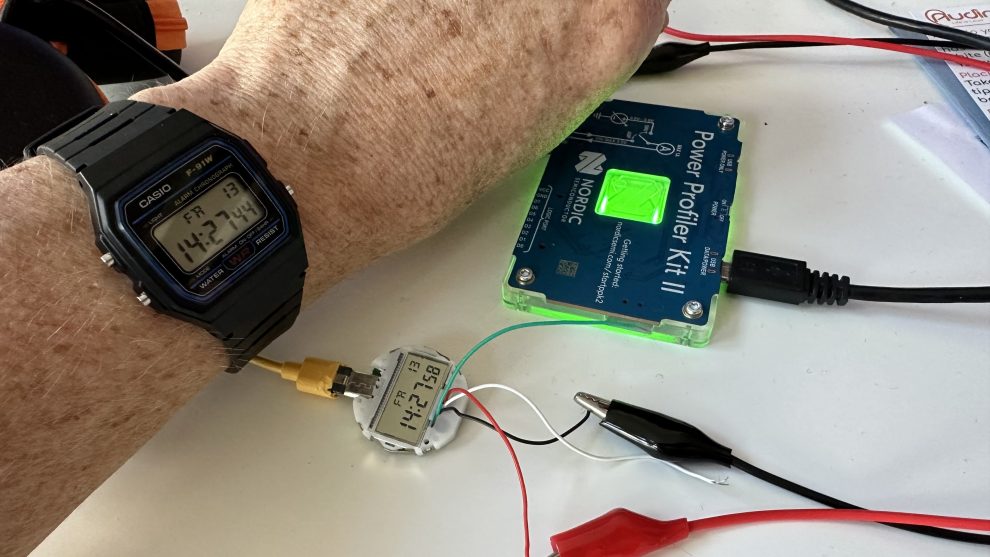Sensor Watch Pro revolutionizes the classic Casio F-91W, turning it into a modular, open-source “smartwatch” powered by an Arm Cortex M0+ microcontroller. Discover the future of retro tech.
In the bustling heart of New York City’s tech district, a small workshop buzzes with activity. Here, Joey Castillo of Oddly Specific Objects is unveiling his latest creation: the Sensor Watch Pro. This innovative device breathes new life into the iconic Casio F-91W, transforming the humble timepiece into a modular, open-source powerhouse.
As I step into the workshop, the air is thick with the scent of solder and the excitement of innovation. Castillo, surrounded by a sea of circuit boards and vintage watch casings, greets me with a grin. “Welcome to the future of retro tech,” he says, holding up what looks like a standard Casio F-91W. But appearances can be deceiving.
Reimagining a Classic: The Birth of Sensor Watch Pro
The Sensor Watch Pro is not your average smartwatch. At its core, it’s a clever board swap that replaces the original quartz movement of the Casio F-91W (or A158W) with a low-power ARM Cortex-M0+ microcontroller. This simple yet ingenious modification opens up a world of possibilities for the decades-old design.
We’re not trying to compete with Apple or Samsung,” Castillo explains as he demonstrates the device. Our goal is to create something unique, something that bridges the gap between vintage aesthetics and modern functionality.”
Enhanced Features: More Than Meets the Eye

As Castillo walks me through the features, it’s clear that the Sensor Watch Pro is a significant upgrade from its predecessor, the Sensor Watch Lite. The new model boasts a louder piezo buzzer, an RGB LED, and an infrared light sensor. But perhaps the most significant improvement is the elimination of any need for soldering.
One of the biggest challenges with the original Sensor Watch was the manual soldering required,” Castillo notes. “With the Pro, we’ve integrated a custom-fabricated metal spring connector. It’s completely plug-and-play now.”
This user-friendly approach extends to other aspects of the design as well. The watch now features a custom LCD that expands the available segments from 72 to 92, allowing for more complex displays. An onboard temperature sensor comes standard, and users can opt to add a MEMS accelerometer sensor board for additional functionality.
Specs and Capabilities
Delving into the technical specifications, the Sensor Watch Pro impresses with its capabilities:
– MCU: Microchip SAM L22 Arm Cortex M0+ microcontroller @ 32 MHz
– Memory: 32KB RAM, 256 KB of Flash (up to 16 KB EEPROM emulation)
– Display: Low-power 92-segment LCD with improved icons and alphanumeric characters
– Sensors: Ambient light, infrared, temperature, and optional LIS2DW accelerometer
– Expansion: Modular 9-pin connector with I2C and five analog inputs or digital IO
– Power: CR2016 coin cell with 1 to 2 years battery life
We’ve packed a lot into this tiny package,” Castillo beams, pointing out the various components. But what really sets it apart is its modularity and open-source nature.
A Community-Driven Approach
As we discuss the software side of things, Castillo’s enthusiasm is infectious. The Sensor Watch Pro runs on a custom, community-developed firmware called Movement. This open-source platform supports dozens of watch faces, ranging from practical tools like interval timers and menstrual cycle trackers to whimsical additions like Wordle and Tarot.
“The beauty of open-source is that the possibilities are endless,” Castillo explains. “We’ve already seen incredible creativity from our community, and we’re excited to see what else they come up with.”
To demonstrate this flexibility, Castillo pulls up an online firmware builder on his laptop. With a few clicks, he combines several watch faces into a custom UF2 file, ready to be loaded onto the device.
Smartwatch or Not? Defining a New Category
As impressive as the Sensor Watch Pro is, it doesn’t quite fit the traditional definition of a smartwatch. Its simple display and lack of smartphone synchronization set it apart from mainstream offerings. However, this distinction doesn’t bother Castillo.
“We’re not trying to be a typical smartwatch,” he states firmly. “We’re creating something different, something that appeals to people who appreciate both vintage aesthetics and modern tinkering.”
This unique positioning has resonated with tech enthusiasts and makers alike. The Sensor Watch Pro’s crowdfunding campaign on Crowd Supply, which launched today, has already generated significant buzz. With a funding goal of $35,000, the campaign offers single boards for $75, with shipping fees of $8 within the US and $18 internationally.
As our tour of the workshop comes to an end, I can’t help but feel excited about the possibilities the Sensor Watch Pro represents. It’s more than just a clever hack; it’s a bridge between past and future, a testament to the enduring appeal of classic design and the limitless potential of modern technology.
Castillo leaves me with a parting thought: “We’re not just selling a product; we’re inviting people to join a community, to be part of something bigger. Whether you’re a seasoned maker or just curious about tech, the Sensor Watch Pro has something for you.”
As I step back onto the bustling New York street, the Casio on my wrist suddenly feels full of untapped potential. The Sensor Watch Pro may not be a conventional smartwatch, but it’s undoubtedly a smart way to breathe new life into a timeless classic.
















Add Comment